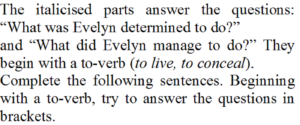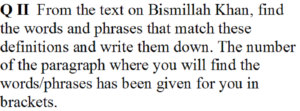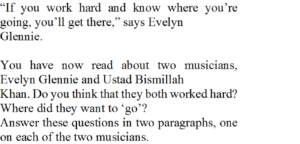English CBSE Class 9 NCERT Beehive Chapter 2 The Sound of Music Free Solution of Textbook Questions and Answers
THE SOUND OF MUSIC
(Textbook Questions)
Part I
Evelyn Glennie Listens to Sound without Hearing It
Thinking about the Text


Answer: She was 17 when she went to Royal Academy of Music.


Answer: Problem with her hearing capacity was first noticed when she was about 8 years old. Her name was called out to play piano and she did not move.
When Evelyn was about 11, her parents took Evelyn to a doctor. The doctor confirmed that her hearing ability had been severely damaged.


Answer: A percussionist Ron Forbes helped her learn music.
He had told her not to listen to music through her ears. He advised Evelyn to feel music through some other means. She started feeling music through various parts of her body. Thus the journey began.


Answer: She has toured UK, and across the globe.
Apart from performing for her livelihood she gives free concerts for prisons and hospitals. She gives high priority to teaching music to young students.


Answer: A percussionist Ron Forbes motivated her learn music. He had told her not to listen to music through her ears. He advised Evelyn to feel music through some other means.
Initially Evelyn could feel the higher drum from the waist up and the lower one from the waist down. Soon Evelyn discovered that she could sense certain notes in different parts of her body.
Music tingled in her skin, her cheekbones and even in her hair. When she played the xylophone, she could sense the sound passing up into her fingertips.
By leaning against the drums, she could feel the resonances flowing into her body. On a wooden platform she removed her shoes so that the vibrations could pass through her bare feet and up her legs.
Thus, through her body and mind, she more than made up her loss of hearing.
****
Part II
The Shehnai of Bismillah Khan
(Textbook Questions)
Thinking about the Text


Answer: Pungi


Answer: A barber


Answer: Professional musicians


Answer: Ali Bux


Answer: Afghanistan


| S N | Bismillah Khan’s feelings about | Positive | Negative | Neutral |
| 1 | teaching children music | √ | ||
| 2 | the film world | √ | ||
| 3 | migrating to the U.S.A. | √ | ||
| 4 | playing at temples | √ | ||
| 5 | getting the Bharat Ratna | √ | ||
| 6 | the banks of the Ganga | √ | ||
| 7 | leaving Benaras and Dumraon | √ |


Answer: Pungi had a shrill and unpleasant sound. Therefore Aurangzeb banned playing of Pungi. Later pungi became the generic name for reeded noisemakers.
![]()
![]()
Answer: Shehnai has a longer and broader pipe than pungi. Shehnai has seven holes in its pipe. Its sound is melodious and pleasing while that of pungi is shrill and unpleasant.


Answer: Traditionally shehnai used to be played at temples and during wedding in North India. It was also a part of traditional ensemble of nine instruments played in royal courts.
Bismillah Khan brought it onto the stage of classical music.


Answer: In 1938, a branch of All India Radio Station opened in Lucknow. Bimillah Khan started playing shehnai there. This is considered a big break for him. Very soon he became the often-heard shehnai player on radio.


Answer: On 15th Aug 1947, Bismillah Khan played shehnai at the Red Fort In Delhi.
It was the India had got independence. He became the first Indian to greet the nation with shehnai.
Thus it is regarded as an historic event.


Answer: Bismillah Khan had strong attachment with temples of Benaras and the river Ganga. Although the temples could be recreated in USA but it was not possible to transport river Ganga there.
So Bismillah Khan refused to move to USA.


Answer: Bismillah Khan refused to move to USA because he may not atmosphere of Benaras there.
He had once said that whenever he was in foreign country, he yearned to come back to India.
Thinking about Language




1. The school sports team hopes to win the trophy. (What does it hope to do?)
2. We all want live healthy and peacefully. (What do we all want to do?)
3. They advised the hearing-impaired child’s mother to consult a specialist doctor. (What did they advise her to do?)
4. The authorities permitted us to stay in the main hall of the building. (What did the authorities permit us to do?)
5. A musician decided to compose a new song. (What did the musician decide to do?)


1. the home of royal people (1) palace
2. the state of being alone (5) solitude
3. a part which is absolutely necessary (2) indispensable
4. to do something not done before (5) invent
5. without much effort (13) effortlessly
6. quickly and in large quantities (9) thick and fast
Q III. Tick the right answer.
1. When something is revived, it (remains dead/lives again). lives again
2. When a government bans something, it wants it (stopped/started). stopped
3. When something is considered auspicious, (welcome it/avoid it). welcome it
4. When we take to something, we find it (boring/interesting). interesting
5. When you appreciate something, you (find it good and useful/find it of no use). find it good and useful
6. When you replicate something, you do it (for the first time/for the second time). for the second time
7. When we come to terms with something, it is (still upsetting/no longer upsetting). no longer upsetting
Writing


Evelyn Glennie
Evelyn Glenie was a normal child till the age of 11. Later she developed an ailment and gradually she became almost deaf. One day she noticed a girl playing xylophone and decided that she too wanted to play it. Many people discouraged but she was determined. She wanted to achieve excellence. She wanted to become one of the top most musician in the world.
It was a tough beginning for Evelyn. She was not able to hear beats of the xylophone. At that juncture Ron Forbes encouraged her. He advised Evelyn to feel the music through other parts of her body. Soon she realised that she could feel sound and vibration through different parts of her body. Throughout her learning phase she worked very hard to feel music. She could feel music through her waist, hair, skin, fingertips, legs and even her skin. It was very tough to acquire such skill. She practiced a lot to be one of the best musician of her era.
Ustad Bismillah Khan
Ustad Bismillah Khan received his lesson of shehnai from his Uncle Ali Bux. He would sit practicing throughout the day. At the temples of Balaji and Mangal Maiya he used to practice alone. He improvised and invented many raagas that were considered to be beyond the range of shehnai.
Bismillah took to music early in life. In 1938 a big break came to him. He started playying at the Lucknow station of AIR. Soon he was the most often heard musician. He was the first person to play shehnai at the Red Fort on 15th Aug 1947. He visited Afghanistan, USA, Montreal, Cannes and many other countries. But he loved India most. He was attached to river Ganaga and mattahs of Dumraon. He wanted to achieve excellence in his work. He was awarded Bharat Ratna – the highest civilian award of the country.
****
WIND
(Textbook Questions)
Thinking about the Poem


Answer: Wind breaks shutters of window. It scatters papers and throws books off the shelf. It tore pages of books and brought rain.


Answer: Winnowing is done for separating grain from chaff. Earlier this used to be done manually. Now a days machines are available to do this work quickly.
Students should themselves answer other parts of this question.


Answer: The wind separates chaff from grain. Similarly difficulties of life separates weak and strong persons.


Answer: The wind god separates grain from the chaff. Poet implies that weak persons are easily disturbed by adversities of life. The weakness could be physical, emotional or financial.


Answer: Weak people are easily affected by adversities of life. Those who are strong become stronger during adversities. Therefore they would be able to handle adversatives calmly an in a friendly manner. Such people are praised by everybody.


Answer: Poet is speaking to the wind in anger. He has blamed wind for causing damage to house and other belongings.
During typhoons and cyclones heavy wind and rains cause lot of damage to property and lives. Human being can hardly do anything about it. It is a feeling of anger and helplessness.
The feeling of poet are almost similar to those felt during onset of cyclone.
****


0 Comments